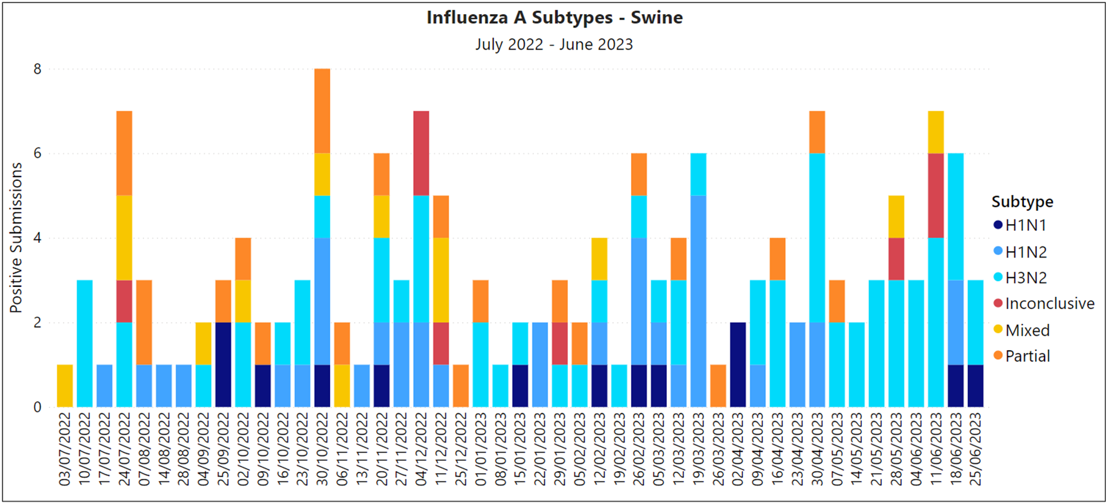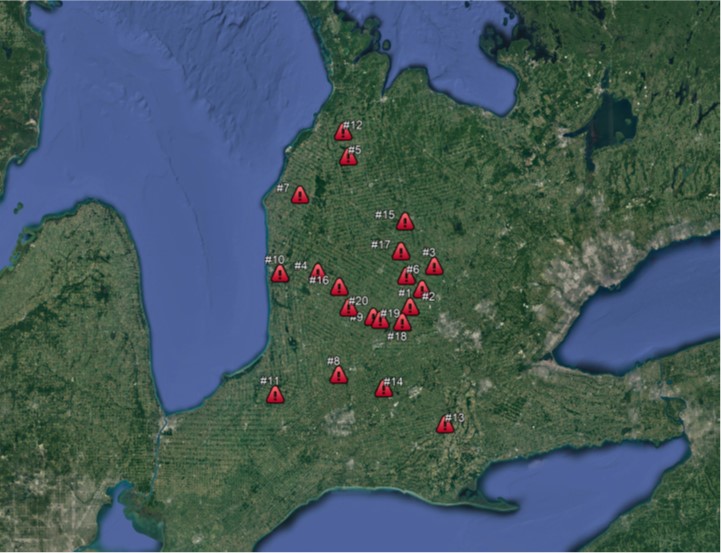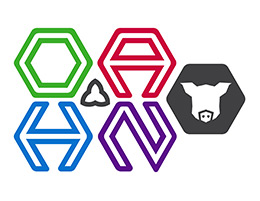Ontario Animal Health Network (OAHN) Swine Network Quarterly Industry Report
Disease Surveillance Discussion
Influenza A
Dr. Kevin Vilaca provided an overview on South West Vets Ontario Influenza surveillance and the detection of a new emerging strain of H3N2. On April 7, 2023 a new H3N2 virus appeared known as cluster 2010.1. This virus is not genetically similar to any of the current regional strains or to any other virus documented in Canadian databases, but was genetically similar to a strain first detected in the U.S.A in 2013 and became the dominant strain in the U.S.A by 2017. Over the next 7 weeks, 12 more cases were reported and sequenced. This new strain often presents as a sudden onset of coughing across all stages of production. Sows off feed with high fevers and abortions is common. Previous Influenza vaccination did not have any influence. Growing pigs present with a sudden onset of coughing, off feed, followed by an increase in mortality due to bacterial pneumonia. Dr. Ojkic from the Animal Health Lab (AHL) communicated to SW Vets that this new strain is now 67% of the isolates sent to the AHL. Dr. Hannah Golightly from OMAFRA, presented the below graph that shows the increase in H3N2 subtypes seen over the past quarter (red text box).


Take Home Messages: Routine Influenza A surveillance provided early detection and warning. Ontario has never seen an Influenza A virus move this quickly, especially during the warmer and dryer months of the year. Based on how this virus behaved in the U.S.A. it is anticipated that cases will increase and it will become the dominant strain in Ontario. This is concerning with the next “flu season” quickly approaching in the fall. Veterinarians, producers and government have an opportunity to be proactive and prevent limiting the spread of this virus. Dr. Vilaca mentioned that South West Vets are currently working with the CFIA to create an emergency monovalent H3N2 vaccine that should be available in September 2023.
Porcine Epidemic Diarrhea (PEDV)/ Porcine Deltacoronavirus (PDCoV)
Jessica Fox, Manger at Swine Health Ontario (SHO) reported that there has been a substantial increase in incidence of both PED and PDCoV since the beginning of Q2 2023. There were 17 cases reported in Q2 2023:
County Name & Case Numbers: Bruce (2), Oxford (11), Lambton (1), Huron (1), Middlesex (1), Waterloo (1)
Disease Type: PED (14) PDCoV (3)
Farm Type: Farrow-to-wean (4), Farrow-to-feeder (1), Farrow-to-finish (1), Nursery (4), Finisher (7)
Jessica also reported that there have been 9 additional cases in Q3 2023 thus far with no new cases reported since July 17.
County Name & Case Numbers: Bruce (1), Gray (1), Oxford (2), Huron (1), Perth (2), Waterloo (2)
Disease Type: PED (9) PDCoV (0)
Farm Type: Finisher (9)
All cases are pursuing elimination working with their veterinarians.
The PED and PDCoV Tracking map is available at the Swine Health Ontario website and shows current and annual cases by county. http://www.swinehealthontario.ca/Disease-Information/PED-PDCoV-Tracking-Map
Take Home Messages: This recent PED and PDCoV outbreak reiterates the importance for producers to have strong biosecurity practices in place and to review them with all staff and personnel that have access to their farms.
International Disease Topics Of Interest Summary
African Swine Fever (ASF)
Croatia: Croatia reported its first cases of ASF on two farms and became the 23rd country in Europe to detect ASF. The 2 farms were just 1 km from the border with Bosnia-Herzegovina which had reported its first case of ASF 1 day earlier. (Feed Strategy 06-28-2023)
Philippines: The Philippines government is considering recommending that pork producers use the Avac ASF vaccine. The Avac vaccine is manufactured in Vietnam and was developed with assistance from the United States Department of Agriculture (USDA). Avac is a single dose vaccine given to pigs from 4 to 10 weeks of age. The Philippines FDA is now evaluating the safety and efficacy of the vaccine. Plans are to order an initial 600,000 doses. (Pig Progress 06-28-2023 )
Germany: The German government is not ready to authorize an ASF vaccine in domestic swine in the near future. Germany will consider an ASF vaccine for wild boars. Any vaccine used in the EU will have to meet high safety standards and be subject to an in-depth approval process. (Feed Strategy 06-19-2023)
Take Home Messages on ASF Vaccine Use: There is currently no commercially licensed vaccine available for ASF prevention or control in North America. Regardless, the use of an ASF vaccine in Canada would be considered a last resort. This is because the decision to vaccinate against a foreign animal disease such as ASF could result in barriers to international trade. Therefore, developed countries such as Canada and the U.S.A. plan to control ASF through efficient and rapid detection and removal of infected and exposed animals.
In developing countries, the use of a vaccine (if one become commercially available) would be the control measure of choice for ASF due to limited resources and veterinary structures available.
How can you Participate in OAHN?
Share the information contained within this report with others involved in the swine industry and with other swine producers. Help us spread the word!
Ask your veterinarian for more information about topics included in this report.


